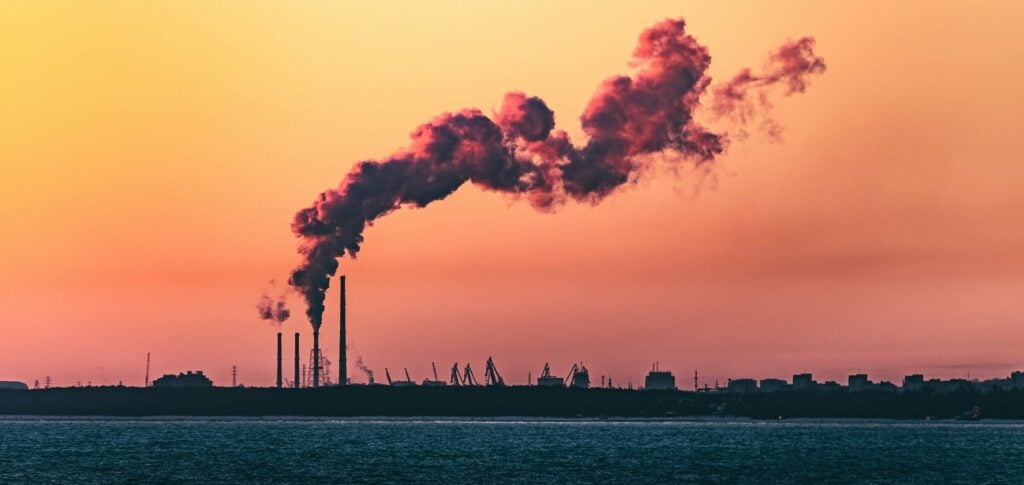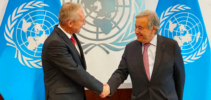🌱 Global Fossil Fuel Registry is launched
O world's first database to track global fossil fuel production, oil and gas reserves, and emissions was released this Monday (19), result of a partnership between Carbon Tracker and Global Energy Monitor. (*)
ADVERTISING
The Global Fossil Fuel Registry was built using data from more than 50 fields in 89 countries, covering around 75% of global reserves, production and emissions. Its launch coincides with climate negotiations taking place at the United Nations General Assembly in New York.
According to the inventory, The world's fossil fuel reserves contain the equivalent of 3,5 trillion tons of greenhouse gases, which would be released if used and would make it difficult to meet international climate goals.
This extraordinary amount corresponds to what would be released into the atmosphere if oil, gas and coal reserves were fully extracted and used, according to this global record.
ADVERTISING
This is equivalent to “more than all emissions produced since the industrial revolution"and "more than seven times the remaining carbon budget to respect the 1,5°C temperature limit“, indicate the authors.
The concept of "carbon budget” indicates the amount of CO2 that can be emitted for a given outcome, i.e. the most ambitious target of the Paris Climate Agreement.
The warming of the planet since the industrial era, which was fueled by fossil energy, has already reached 1,1°C, causing a series of catastrophes.
ADVERTISING
The International Energy Agency (IEA) had suggested last year to forgo any oil or gas projects to accompany a rapid reduction in demand and maintain the global warming under control.
The ambition of the record is provide political leaders and civil society with the data necessary to manage the progressive abandonment of these fossil energies.
The record especially shows that United States and Russia each have sufficient fossil fuel reserves to make blow up the entire world carbon budget, even if all other countries immediately cease production.
ADVERTISING
Also identifies the most powerful source of emissions in the world: the Ghawar oil field in Saudi Arabia.
“The global registry will help governments, companies and investors to make decisions to adapt their fossil fuel production to the temperature limit of 1,5°C and, in this way, concretely prevent the disappearance of our islands”, highlighted Simon Kofe , Minister of Foreign Affairs of Tuvalu, one of the Pacific archipelagos threatened by rising water levels and global warming.
🍃 Businessmen buy land to form preservation 'corridor' in the Pantanal
While the preservation of fauna and flora is not part of the priority projects of Brazilian governments, groups of people that include businessmen, bankers, doctors and even a formerpilotthe racing team try, on their own, to guarantee the conservation of the Pantanal by purchasing farms in the region to preserve them. The focus is on strategic areas for the biome that are under some degree of threat.
ADVERTISING
With direct purchases, donations for third-party purchases and membership of local farmers, which assume preservation commitments, the group currently accounts for 536 thousand hectares (5,3 thousand km²) where crops that degrade soil and rivers – such as soybean planting –, predatory fishing, animal hunting and deforestation are excluded. There is also a commitment to create brigades to prevent or fight fires.
The area is equivalent to three and a half times the city of São Paulo. Of the entire Pantanal, it represents a share of 3,5%.
The conservation of this territory involves two organized groups that purchase or manage private properties. One of them is called 5P Alliance (pantanal, preservation, partnerships, livestock and productivity), which currently brings together 12 farms, forming one of the largest private wildlife corridors in the world.
The other group, from Serra do Amolar, is coordinated by the Instituto Homem Pantaneiro (IHP), with seven farms and five RPPNs (Private Natural Heritage Reserve). It is chaired by Ângelo Rabelo, a retired colonel who helped create the Environmental Military Police in Mato Grosso do Sul.
Both areas are connected to two parks, the Pantanal Matogrossense National Park, which is public but receives help from the IHP, and the Pantanal do Rio Negro State Park, both in Mato Grosso do Sul.
The groups' objective is to continue purchasing areas with good diversity, especially those at risk of deforestation or being acquired by people withoutprometaken with preservation. The intention is to form large ecological corridors and maintain the biome as the most preserved in the country.
🚢 New research ship from the Brazilian Antarctic Program
Last week, the Navy signed a contract for the construction of a new ship to support the Brazilian Antarctic Program (PROANTAR). The construction of the Antarctic Support Ship (Napant) will be carried out by Polar 1 Construção Naval. It is expected to be delivered by September 2025system. (Agency Brazil)
Created on January 12, 1982, the PROANTAR aims to promote diverse and high-quality scientific research in the Antarctic region, with the purpose of:
- understand the phenomena that occur there, which have global repercussions and, in particular, on Brazilian territory; It is
- guarantee the country the status of Consultative Member of the Antarctic Treaty, achieved in 1983, which ensures Brazil's full participation in decision-making processes relating to the future of the White Continent. (PROANTAR)
Among its functions are taking supplies to the Comandante Ferraz Antarctic Station (the Brazilian scientific base located on King George Island), supporting researchers and carrying out oceanographic surveys on the route between Brazil and the island.
🌿 The world can achieve carbon neutrality by 2050, says UN
Despite energy crises and international challenges, the world can still achieve carbon neutrality if the right measures are taken. This is the conclusion of a report from the United Nations Economic Commission for Europe (Unece*), released this Monday (19).
The document reflects the opinion of international experts and statisticians from Europe, North America and Central Asia and lists a series of policy and technology solutions for the region to achieve carbon neutrality by 2050.
The report indicates that To achieve neutrality it will be necessary:
- Diversify the supply of primary and final energy with all low and zero carbon technologies;
- Accelerate the phase-out of fossil fuels;
- Increase electrification of all sectors with a focus on renewable energy and nuclear energy. New forms of energy storage (electrical, mechanical, thermal and chemical) will need to be developed to reduce the need for energy backup; It is
- Build capacity to support widespread innovation of low- and zero-carbon technologies including carbon sequestration, use and storage, Ccus, hydrogen and advanced nuclear power. (UN News)
🇫🇷 Versailles and Louvre will turn off the lights early
After the Eiffel Tower it's the turn of the Louvre Museum and the Palace of Versailles: both places will turn off their lights early, a “symbolic” measure to raise awareness of the energy crisis in France, announced the Minister of Culture, Rima Abdul Malak.
“From Saturday night, the Louvre pyramid will be turned off at 23 pm instead of 1 am,” said Malak, following similar measures adopted by Paris city hall, which decided to turn off the lighting at the Eiffel Tower and headquarters earlier. of the city hall.
“We will turn off the lighting on the facade of the Palace of Versailles at 22pm instead of 23pm next week,” he added.
“Symbols are important to raise awareness among the population”, declared the minister, although he admitted that “symbolic measures” are not enough.
O Curto Verde is a daily summary of what you need to know about the environment, sustainability and other topics linked to our survival and that of the planet.
(With AFP e Estadão Content)
(🚥): may require registration and/or signature
(🇬🇧): content in English
(*): content in other languages is translated by Google Tradutor




